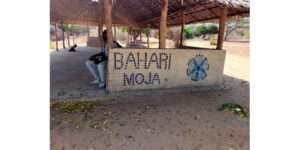A group of women in the far-flung island of Mkokoni on the Lamu-Somalia border have started an initiative to save the beaches and the marine ecosystem from plastic pollution.
The women are using throw-away plastics and glass waste to build homes and recreational structures.
When we visit to Mkokoni Island, we are welcomed with clean beaches and structures made from plastic waste, thanks to the women’s dedication to ensure they achieve a plastic free-environment.
Lamu has had the challenge of careless plastic waste disposal in the ocean for several years.
Most beaches, notably Mkokoni, Kiunga, Ishakani, Kiwayu, Kizingitini, Faza, Matondoni, Kipungani, Wiyoni, and surrounding areas within the Lamu Archipelago, have always choked from the immense plastic waste including used water bottles, straws, old fishing nets, and abandoned damaged boats.
This influenced the women to embark on the initiative. They have set particular dates when they go round the beaches to collect the plastics and assemble them in one place, before preparing them for use in the construction of houses.
Today, Mkokoni Island has become one of the few beaches considered the cleanest in the area.
Maimuna Shee, one of the women environmentalists leading the initiative to recycle plastics and a resident of the area, says they have ensured no plastics roam their beaches.
Environmental conservation
Ms Shee says they introduced the initiative about ten years ago, even before the countrywide ban on plastic bags was implemented.
The Kenyan government outlawed single-use plastic bags in August 2017, as a key step towards environmental conservation and protection.
Ms Shee stresses that their mission as Mkokoni women is not only to collect and recycle plastics, but also to sensitize the community on the importance of maintaining a clean environment.
“As you can see, most of the houses and resting platforms here are made from recycled plastic bottles, bags, and glass waste. We usually stuff these paper bags into plastic bottles. Then the bottles are carefully placed one on top of the other, to form the walls, after which the tops and the sides are reinforced with light patches of cement or mud to hold them in place,” says Ms Shee.
She adds: “This has enabled us to have a plastic-free environment in our beaches as you can see.”
Salma Mohamed, another member of the group says apart from boosting the cleanliness of the beaches, the initiative has also provided a conducive breeding ground for turtles.

“Clean beaches are suitable grounds for nesting by turtles. We have experienced this first-hand here in Mkokoni. Since we started this initiative, many beaches have become major nesting sites for the turtles,” says Ms Mohamed.
The women have also been able to spread the gospel of keeping a clean and friendly environment amongst fellow residents in the area.
“Through this program, we have identified specific dumping sites where people throw the waste instead of littering them everywhere. We then trace those wastes and recycle them by building these beautiful structures,” says Fatma Bwana.
Lamu’s Wild Wide Fund for Nature (WWF) Marine Project Officer, Hassan Bwanamkuu, lauded the efforts by the Mkokoni women in preserving a clean environment free from plastics.
“The clean beaches are really helping turtles to breed in large numbers. Turtle deaths resulting from plastic waste consumption in the Indian Ocean in Lamu, have also reduced, all thanks to these women environmentalists’ efforts,” said Mr Bwanamkuu.
Credit: Source link